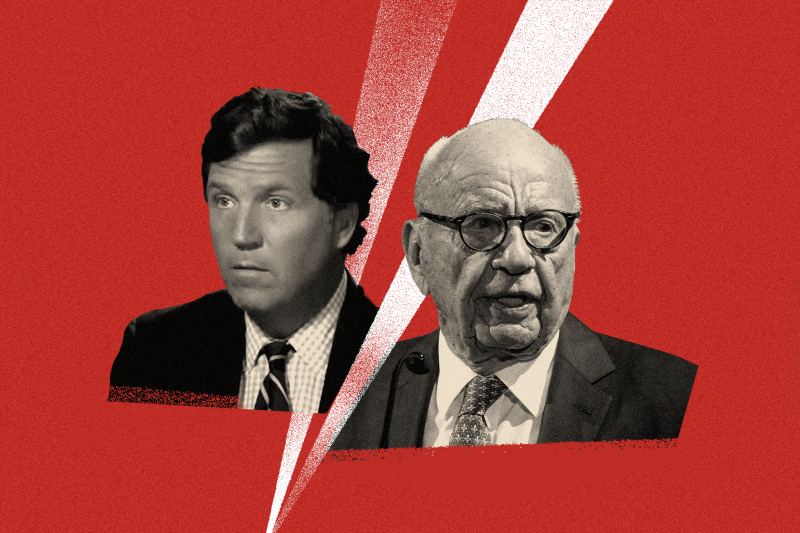One of the most closely watched media trials in decades begins Monday morning in a Delaware courtroom, as Fox News defends itself against a $1.6 billion defamation lawsuit brought by a voting technology company that says its business was severely damaged by lies about a stolen presidential election.
At its core, the trial will test the limits of libel law and whether Fox News can be held legally accountable for airing false election fraud claims about Dominion Voting Systems in the wake of Donald Trump’s 2020 loss. Dominion will focus on 20 statements about the voting technology company made by either attorneys associated with Trump — Rudy Giuliani and Sidney Powell — or by Fox hosts Maria Bartiromo, Jeanine Pirro and Lou Dobbs.
But outside the courtroom, the proceedings have come to represent even more, providing the public an unparalleled look inside the operations of a media juggernaut and a key force in Republican politics. A vast trove of text messages, emails and other internal communications among executives and hosts have been made public. Once the trial gets underway, on-air personalities such as prime-time ratings champ Tucker Carlson, Bartiromo and others are expected to testify, as could conservative billionaire founder Rupert Murdoch.
Podcast episode
Some observers also view the trial, which is expected to last up to six weeks, as a symbolic referendum on the truth-challenged “alternative facts” culture that defined the Trump presidency. “It appears that disinformation is on trial,” said Jonathan Peters, a media law professor at the University of Georgia.
All along, Fox has denied Dominion’s allegations and publicly argued that the case has put the rights of a free press on the line. “Dominion’s lawsuit is a political crusade in search of a financial windfall, but the real cost would be cherished First Amendment rights,” the network said in a statement.
The trial has been more than two years in the making. In the days and weeks after the 2020 presidential election, Trump and his allies began sowing the false theory that the election had been stolen. Powell and Giuliani, presented as Trump-aligned attorneys, joined Fox broadcasts to share baseless conspiracy theories, such as one tying Dominion to Venezuelan socialist strongman Hugo Chávez. Some hosts seemed to lend credence to the claims.
Dominion alerted Fox hosts and executives thousands of times that the claims were false, documents show. “You guys know this is all bulls—. Everyone knows it,” Tony Fratto, a veteran public relations strategist working on behalf of Dominion wrote on Nov. 24 to Fox News President Jay Wallace. “This is reckless.” Fratto, who served in the George W. Bush administration, also wrote to Bartiromo, calling the claims from Powell and Giuliani “tinfoil hat conspiracy stuff.”
Dominion filed a lawsuit in March 2021.
The courts have historically granted the media wide latitude to make honest mistakes about public figures, which can include companies. Dominion has to prove that Fox behaved with “actual malice” — meaning its hosts and executives knew the claims were false, or had a high degree of doubt, but aired them anyway. Dominion claims Fox, panicked about ratings as rival right-wing networks went all in on the stolen-election myth, gave the claims airtime to appease Trump-supporting viewers.
“The emails, texts, and deposition testimony speak for themselves,” Dominion said in a statement. “We welcome all scrutiny of our evidence because it all leads to the same place — Fox knowingly spread lies causing enormous damage to an American company.”
Even though defamation lawsuits are notoriously difficult to win, legal experts say Dominion’s case against Fox is unusually strong, and not just because of the sheer amount of evidence.
The judge, Eric M. Davis, has already undercut some of Fox’s key arguments. Fox will not able to defend itself against the defamation charge by arguing that it was simply covering the news, nor can it say that the false claims of election fraud reflected their hosts’ and guests’ First Amendment-protected opinions, according to the judge’s ruling last month.
Fox also can’t argue that there might be truth to the conspiracy theories nor that they had no effect on Dominion’s reputation. Evidence shows it’s “CRYSTAL clear that none of the statements relating to Dominion about the 2020 election are true,” Davis wrote.
That means the jury is left to decide whether Fox knew or should have known the claims were false when the network aired them — and if so, how much to award Dominion in damages. Fox has argued vociferously that the $1.6 billion amount Dominion is claiming is out of line with the voting machine company’s worth.
Davis issued a harsh rebuke to Fox last week after Dominion alleged that the network has withheld key pieces of evidence that the plaintiff’s attorneys should have been entitled to see before the trial. (A lawyer for Fox sent the judge a letter on Friday that acknowledged a lapse and apologized.)
Davis has also limited Dominion — ruling that the company can’t suggest Fox’s election falsehoods contributed to the Jan. 6 insurrection at the U.S. Capitol. Nor can Dominion detail threats company employees received after Fox aired the claims.
And the onus ultimately rests with Dominion to prove that the people responsible for what was said on air knew better.
Fox has said it is defending the press, arguing that a Dominion victory would have “grave consequences for the entire journalism profession.” Meanwhile, some on the right, including Trump, have said that media organizations have too much legal protection and it should be easier to sue them and win.
But First Amendment advocates aren’t convinced a Fox loss is bad for journalism — and think Dominion has a much stronger case than most defamation plaintiffs.
“The journalistic sins, which have already been exposed here, are so grievous and so indefensible that a victory for Fox will be hard to explain to the public,” said Floyd Abrams, senior counsel at Cahill Gordon & Reindel, who has long represented media companies.
“If the message of the case is ‘anything goes,’ that one can [book guests] who you know are lying and saying defamatory things and you, as a broadcaster, don’t get in trouble at all,” he added, that would mean adopting “the cynical view that this is what the press is, and this is what the press does.”
Regardless of whether Dominion wins, the lawsuit has inflicted damage to Fox’s public image, though the network’s ratings have held steady. Hundreds of thousands of pages of internal communications and other records made public after the discovery process have made headlines by exposing private turmoil and backbiting within the company. They have also shown network executives and stars in conflict over Fox’s role in the political landscape. After the 2020 vote, some who spent years defending or boosting Trump on air yearned to break ties.
“I hate him passionately,” Carlson texted a colleague about Trump on Jan. 4, 2021. Murdoch fretted in the weeks after the election that the lame-duck president seemed to be going “increasingly mad.”
Laura Ingraham, another prime-time host close to Trump, expressed disdain for Powell, the lawyer appearing on Fox shows accusing Dominion of fraud. “A complete nut,” Ingraham texted.
The heart of Dominion’s case will likely rest on other messages, many from lesser-known executives and producers, expressing doubt and concern about the election conspiracy theories circulating on Fox shows.
“I worry about claiming all this election fraud. The allegations are so slim,” Tiffany Fazio, a producer for prime-time star Sean Hannity, texted on Nov. 6, 2020, to Porter Berry, a longtime Hannity producer who is now a network executive. “Gotta stay away from crazytown,” he replied.
“This sounds SO F—— CRAZY btw,” Fox executive Raj Shah emailed a colleague while watching Giuliani speak about supposed voter fraud at a Washington news conference.
Part of Fox’s defense will rest on the argument that, no matter what doubts some Fox personnel harbored in private communications, they were not necessarily the people responsible for what was said on air. And Fox has argued that the hosts who fulminated on their shows about supposed voter fraud were sincere in their belief that it may have happened.
After Fratto pleaded with Bartiromo to push back on Powell’s baseless allegations about Dominion in November 2020, she replied, “I’m not sure what to think.” She then added: “Do you believe this election was honest? I have heard from so many people who do not.”
The Dominion-Fox lawsuit, broken down
1/7
End of carousel
But other messages show high-level executives and others expressing concern that even questioning election-fraud claims on the air would alienate a Trump-loving audience willing to believe them.
“News guys have to be careful how they cover this rally,” Murdoch’s son Lachlan, the head of Fox’s parent company, warned Suzanne Scott, the CEO of Fox News, after watching two news correspondents on the scene of a post-election Trump rally call the president’s fraud claims “unfounded.” (One of the correspondents left the network months later.)
The concern, emails suggest, was crystallized by a brief ratings loss for Fox News in the weeks after the election.
“Respecting this audience whether we agree or not is critical,” Hannity wrote in a message to his producers, one of whom responded that the host’s most-watched programs from the previous week focused on “voting irregularities.”
The documents reveal the “intimate connections between the administration, the Republican Party and conservative media,” said Julian Zelizer, a professor of American history at Princeton.
“What you see clearly is top-level hosts and staff either openly saying that they need to hold the party line — literally — and do the right thing as it relates to what the president’s supporters want,” he said. “It confirms the worst fears of how this worked.”








